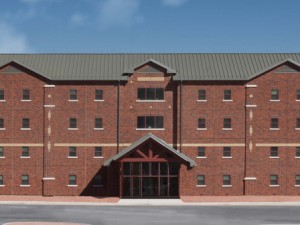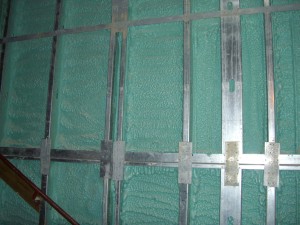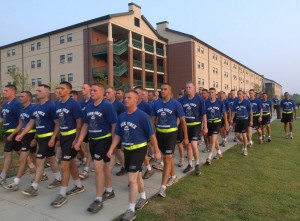NCFI Spray Foam Helps U.S. Army Build Better, Healthier, More Comfortable Housing for Soldiers at Ft. Bragg
Housing is designed per new Corps of Engineers standards for efficient building enclosures.
 MOUNT AIRY, NC—For men and women in the military, home is any spot in which you are ordered to drop your gear. For 600 lucky soldiers at Ft. Bragg, NC, that home will be warm, safe, dry and meet the Army's new high standards for air tightness, thanks in part to NCFI's high performance spray foam insulation.
MOUNT AIRY, NC—For men and women in the military, home is any spot in which you are ordered to drop your gear. For 600 lucky soldiers at Ft. Bragg, NC, that home will be warm, safe, dry and meet the Army's new high standards for air tightness, thanks in part to NCFI's high performance spray foam insulation.
Ft. Bragg is one of the largest and busiest military complexes in the world with over 43,000 personnel. The base is home to America's only airborne corps and airborne division, the 82nd Airborne, plus the "Green Berets" of the Special Operations Command, and the Army's largest support command. Its size and importance make it the ideal base to try out the Army's new modular housing, called a UEPH (Unaccompanied Enlisted Personnel Housing), due to open in May 2010.
According to the Corps of Engineers, the UEHP "will house single soldiers and is intended to be similar both functionally and technically to apartment type housing in the private sector. The soldier's room shall include: private sleeping areas, walk-in closets, a shared bathroom and kitchenette."
The UEPH is unique because it is designed according to new exacting standards recently adopted by the Corps of Engineers for “efficient building enclosures.” The new mandate requires building enclosures to exhibit an air tightness metric of .25 cubic feet per minute (cfm) per square foot envelope at 75 Pascals—a requirement far exceeding that of the typical civilian home. The Military Engineer magazine says the Corps of Engineers has “taken a leading role in requiring field performance testing to measure and verify air tightness . . .” (Sept/Oct 2009).
 While most builders know of InsulStar’s exceptional R-Value, this project highlights the product’s quality as an air barrier. The general contractor was required by the specifications to provide a tight building utilizing an air barrier to complement the insulation, so they chose NCFI’s InsulStar, which, by nature, is an air barrier.
While most builders know of InsulStar’s exceptional R-Value, this project highlights the product’s quality as an air barrier. The general contractor was required by the specifications to provide a tight building utilizing an air barrier to complement the insulation, so they chose NCFI’s InsulStar, which, by nature, is an air barrier.
“InsulStar is a multi-use product—high performance insulation, air barrier, moisture barrier, and includes an anti-microbial agent, so it doesn’t surprise me they chose it,” says Brian Nuhfer, president of Foam Applicators, Inc., and a second-generation insulation applicator. “NCFI’s spray foams are simply the best, period.”
Nuhfer spent more than three weeks at the five-story, $45 million facility applying InsulStar to the walls and roof. He also insulated the critical outside corner spaces — a common problem spot for many buildings, but not a concern for this job. “InsulStar fills every nook and cranny in the corners providing an ultra-tight seal.”
 The Army benefits from such attention to detail not only in dollars saved on energy costs, but also in something less tangible: the peace of mind of Army personnel. “Unaccompanied” means “single”, that is, the enlisted soldiers who truly call the Army home. Kevin Watson, NCFI’s project manager for the Ft. Bragg job, says, “NCFI believes our soldiers deserve a home that is safe, comfortable and healthy. A place in which they can relax and have some downtime.”
The Army benefits from such attention to detail not only in dollars saved on energy costs, but also in something less tangible: the peace of mind of Army personnel. “Unaccompanied” means “single”, that is, the enlisted soldiers who truly call the Army home. Kevin Watson, NCFI’s project manager for the Ft. Bragg job, says, “NCFI believes our soldiers deserve a home that is safe, comfortable and healthy. A place in which they can relax and have some downtime.”
“They easily attain the new standards,” says Nuhfer who points to the tens of thousands of square feet of foam he applied to the UEPH. With a crew of only three applicators, they were able to work around tight deadlines, power outages, and crowded conditions. “It was a typical chaotic construction site,” laughs Nuhfer. “Except it was highly organized by Archer Western, the general contractor. Like a good symphony.”
Nuhfer says he is proud of the work his company did on this building. “I know for certain this building will be efficient, safe and comfortable for these soldiers—and frankly that just makes me feel good,” he says. Watson agrees, “Those soldiers sacrifice every day for the rest of us, we’re just glad we could help make their living space comfortable. There is no need for them to sacrifice comfort too.”
Nuhfer adds, “It makes me proud that my company’s hard work, and the superior NCFI products we used, make the soldiers’ jobs and lives a little better.”















